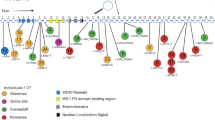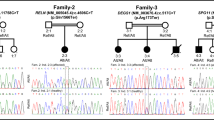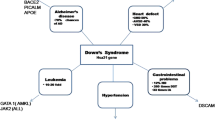Abstract
Objective
CHARGE syndrome is a rare autosomal dominant (AD) multi-system disorder with a broad and variable clinical manifestation and occurs in approximately 1/10,000 newborns in the world. Mutations in the CHD7 gene are the genetic cause of over 90% of patients with typical CHARGE syndrome. The present study reported a novel variant in the CHD7 gene in a Chinese family with an abnormal fetus.
Methods
Routine prenatal ultrasound screening showed fetal heart abnormality and left foot varus. Chromosomal microarray analysis (CMA) and fetus-parent whole-exome sequencing (trio-WES) were performed to determine the genetic cause of the fetus. The candidate variant was further verified using Sanger sequencing.
Results
CMA analysis revealed normal results. However, WES analysis identified a de novo heterozygous variant of c.2919_2922del (NM_017780.4) on exon 11 of CHD7 gene, resulting in a premature truncation of the CHD7 protein (p.Gly975*). The variant was classified as Pathogenic (PVS1 + PS2_Moderate + PM2_Supporting) based on the ACMG guidelines. Combined with the clinical phenotype of fetal heart abnormalities, it was confirmed CHARGE syndrome.
Conclusion
We identified a novel heterozygous variant c.2919_2922del in CHD7 of a Chinese fetus with CHARGE syndrome, enriching the genotype-phenotype spectrum of CHD7. These results suggest that genetic testing could help facilitate prenatal diagnosis of CHARGE syndrome, thus promoting the appropriate genetic counseling.





Similar content being viewed by others
Data availability
The data underlying this article will be shared on reasonable request to the corresponding author.
References
Bajpai R, Chen DA, Rada-Iglesias A, Zhang J, Xiong Y, Helms J, Chang CP, Zhao Y, Swigut T, Wysocka J (2010) CHD7 cooperates with PBAF to control multipotent neural crest formation. Nature 463:958–962
Batsukh T, Pieper L, Koszucka AM, von Velsen N, Hoyer-Fender S, Elbracht M, Bergman JEH, Hoefsloot LH, Pauli S (2010) CHD8 interacts with CHD7, a protein which is mutated in CHARGE syndrome. Hum Mol Genet 19:2858–2866
Bergman JE, de Ronde W, Jongmans MC, Wolffenbuttel BH, Drop SL, Hermus A, Bocca G, Hoefsloot LH, van Ravenswaaij-Arts CM (2012) The results of CHD7 analysis in clinically well-characterized patients with Kallmann syndrome. J Clin Endocrinol Metab 97:E858–862
Blake KD, Davenport SL, Hall BD, Hefner MA, Pagon RA, Williams MS, Lin AE, Graham JM Jr (1998) CHARGE association: an update and review for the primary pediatrician. Clin Pediatr (Phila) 37:159–173
Butcher D, Cytrynbaum C, Turinsky A, Siu M, Inbar-Feigenberg M, Mendoza-Londono R, Chitayat D, Walker S, Machado J, Caluseriu O et al (2017) CHARGE and Kabuki Syndromes: gene-specific DNA methylation signatures identify epigenetic mechanisms linking these clinically overlapping conditions. Am J Hum Genet 100:773–788
Cairns BR (2007) Chromatin remodeling: insights and intrigue from single-molecule studies. Nat Struct Mol Biol 14:989–996
Delahaye A, Sznajer Y, Lyonnet S, Elmaleh-Bergès M, Delpierre I, Audollent S, Wiener-Vacher S, Mansbach AL, Amiel J, Baumann C et al (2007) Familial CHARGE syndrome because of CHD7 mutation: clinical intra- and interfamilial variability. Clin Genet 72:112–121
DePristo M, Banks E, Poplin R, Garimella K, Maguire J, Hartl C, Philippakis A, del Angel G, Rivas M, Hanna M et al (2011) A framework for variation discovery and genotyping using next-generation DNA sequencing data. Nat Genet 43:491–498
Fu F, Li R, Li Y, Nie ZQ, Lei T, Wang D, Yang X, Han J, Pan M, Zhen L et al (2018) Whole exome sequencing as a diagnostic adjunct to clinical testing in fetuses with structural abnormalities. Ultrasound in Obstetrics & Gynecology 51:493–502
Fung JLF, Yu MHC, Huang S, Chung CCY, Chan MCY, Pajusalu S, Mak CCY, Hui VCC, Tsang MHY, Yeung KS et al (2020) A three-year follow-up study evaluating clinical utility of exome sequencing and diagnostic potential of reanalysis. NPJ Genom Med 5:37
Gao X, Gordon D, Zhang D, Browne R, Helms C, Gillum J, Weber S, Devroy S, Swaney S, Dobbs M et al (2007) CHD7 gene polymorphisms are associated with susceptibility to idiopathic scoliosis. Am J Hum Genet 80:957–965
Granadillo JL, Wegner DJ, Paul AJ, Willing M, Sisco K, Tedder ML, Sadikovic B, Wambach JA, Baldridge D, Cole FS et al (2021) Discovery of a novel CHD7 CHARGE syndrome variant by integrated omics analyses. Am J Med Genet A 185:544–548
Gug C, Gorduza E, Lăcătuşu A, Vaida M, Bîrsăşteanu F, Puiu M, Stoicănescu D (2020) CHARGE syndrome associated with (I1460Rfs15) frameshift mutation of CHD7 gene in a patient with arteria lusoria and horseshoe kidney. Experimental and therapeutic medicine 20:479–485
Hale CL, Niederriter AN, Green GE, Martin DM (2016) Atypical phenotypes associated with pathogenic CHD7 variants and a proposal for broadening CHARGE syndrome clinical diagnostic criteria. Am J Med Genet Part A 170:344–354
Hsu P, Ma A, Wilson M, Williams G, Curotta J, Munns CF, Mehr S (2014) CHARGE syndrome: a review. J Paediatr Child Health 50:504–511
Janssen N, Bergman JE, Swertz MA, Tranebjaerg L, Lodahl M, Schoots J, Hofstra RM, van Ravenswaaij-Arts CM, Hoefsloot LH (2012) Mutation update on the CHD7 gene involved in CHARGE syndrome. Hum Mutat 33:1149–1160
Jongmans MCJ, Admiraal RJ, van der Donk KP, Vissers LELM, Baas AF, Kapusta L, van Hagen JM, Donnai D, de Ravel TJ, Veltman JA et al (2006) CHARGE syndrome: the phenotypic spectrum of mutations in the CHD7 gene. J Med Genet 43:306
Kim HG, Kurth I, Lan F, Meliciani I, Wenzel W, Eom SH, Kang GB, Rosenberger G, Tekin M, Ozata M et al (2008) Mutations in CHD7, encoding a chromatin-remodeling protein, cause idiopathic hypogonadotropic hypogonadism and Kallmann syndrome. Am J Hum Genet 83:511–519
Krueger LA, Morris AC (2022) Eyes on CHARGE syndrome: roles of CHD7 in ocular development. Front Cell Dev Biol 10:994412
Legendre M, Abadie V, Attie-Bitach T, Philip N, Busa T, Bonneau D, Colin E, Dollfus H, Lacombe D, Toutain A et al (2017) Phenotype and genotype analysis of a french cohort of 119 patients with CHARGE syndrome. Am J Med Genet C Semin Med Genet 175:417–430
Li H, Durbin R (2009) Fast and accurate short read alignment with Burrows–Wheeler transform. Bioinformatics 25:1754–1760
Nie J, Ueda Y, Solivais AJ, Hashino E (2022) CHD7 regulates otic lineage specification and hair cell differentiation in human inner ear organoids. Nat Commun 13:7053
Platt JL, Kent NA, Kimmel AR, Harwood AJ (2017) Regulation of nucleosome positioning by a CHD type III chromatin remodeler and its relationship to developmental gene expression in Dictyostelium. Genome Res 27:591–600
Reddy NC, Majidi SP, Kong L, Nemera M, Ferguson CJ, Moore M, Goncalves TM, Liu HK, Fitzpatrick JAJ, Zhao G et al (2021) CHARGE syndrome protein CHD7 regulates epigenomic activation of enhancers in granule cell precursors and gyrification of the cerebellum. Nat Commun 12:5702
Richards S, Aziz N, Bale S, Bick D, Das S, Gastier-Foster J, Grody WW, Hegde M, Lyon E, Spector E et al (2015) Standards and guidelines for the interpretation of sequence variants: a joint consensus recommendation of the American College of Medical Genetics and Genomics and the Association for Molecular Pathology. Genet Med 17:405–424
Ritter KE, Lynch SM, Gorris AM, Beyer LA, Kabara L, Dolan DF, Raphael Y, Martin DM (2022) Loss of the chromatin remodeler CHD7 impacts glial cells and myelination in the mouse cochlear spiral ganglion. Hear Res 426:108633
Schnetz MP, Bartels CF, Shastri K, Balasubramanian D, Zentner GE, Balaji R, Zhang X, Song L, Wang Z, Laframboise T et al (2009) Genomic distribution of CHD7 on chromatin tracks H3K4 methylation patterns. Genome Res 19:590–601
Tarasov A, Vilella AJ, Cuppen E, Nijman IJ, Prins P (2015) Sambamba: fast processing of NGS alignment formats. Bioinformatics 31:2032–2034
Verloes A (2005) Updated diagnostic criteria for CHARGE syndrome: a proposal. Am J Med Genet Part A 133A:306–308
Wang K, Li M, Hakonarson H (2010) ANNOVAR: functional annotation of genetic variants from high-throughput sequencing data. Nucleic Acids Res 38:e164–e164
Wang S, Lin Y, Liang P, Li Q, Li W, Wang Z, Wang J, Chen J, Zha D (2022) De novo Splice Site Mutation of the CHD7 gene in a chinese patient with typical CHARGE syndrome. ORL J Otorhinolaryngol Relat Spec 84:417–424
Wu X, Chen L, Lu W, He S, Li X, Sun L, Zhang L, Wang D, Zhang R, Liu Y et al (2022) Discovery of Novel Variants on the CHD7 gene: a Case Series of CHARGE Syndrome. Front Genet 13:852429
Author information
Authors and Affiliations
Contributions
YS and LY performed most of WES analysis and prepared the manuscript. LL, XG and JJ analyzed, interpreted the data, and modified the manuscript. All authors discussed the data and read the manuscript.
Corresponding author
Ethics declarations
Conflict of interest
Yanhong Shan, LingFang Yao, Linli Li, Xueping Gao, Jinghan Jiang declare that they have no conflict of interest.
Ethical approval
This study had been approved by the Huangshi love &health hospital affiliated of Hubei Polytechnic University. Informed consent was obtained from all individual participants included in the study.
Additional information
Publisher’s Note
Springer Nature remains neutral with regard to jurisdictional claims in published maps and institutional affiliations.
Electronic supplementary material
Below is the link to the electronic supplementary material.
Rights and permissions
Springer Nature or its licensor (e.g. a society or other partner) holds exclusive rights to this article under a publishing agreement with the author(s) or other rightsholder(s); author self-archiving of the accepted manuscript version of this article is solely governed by the terms of such publishing agreement and applicable law.
About this article
Cite this article
Shan, Y., Yao, L., Li, L. et al. A novel CHD7 variant in a chinese family with CHARGE syndrome. Genes Genom 46, 379–387 (2024). https://doi.org/10.1007/s13258-023-01411-8
Received:
Accepted:
Published:
Issue Date:
DOI: https://doi.org/10.1007/s13258-023-01411-8




